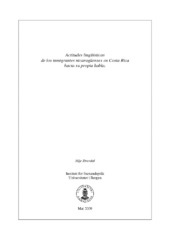| dc.description.abstract | This thesis describes the linguistic attitudes in a group of 60 Nicaraguan immigrants in Costa Rica, towards their own Nicaraguan dialect of Spanish. The data was collected using a questionnaire of 25 items, to be ranked on a five-point Likert scale. The results were then analyzed along four dimentions: identity, prejudice, social mobility and perception of differences between the linguistic varieties. The study also touches upon the use of linguistic convergence as a social mobility tool. The respondents generally show a high level of linguistic insecurity. Their attitudes towards their own dialect are most negative in the social mobility dimension; many of them consider it necessary or advantageous to use the more prestigious Costa Rican dialect when interacting with Costa Rican native speakers. However, the informants also show loyalty towards their own Nicaraguan dialect, and stress the importance of the maintenace of this variety for use in ingroup contexts. Looking closer at the four variables of gender, age, region and occupation, one detects the following: the results show little or no variation according to the age or gender of the respondents, although attitudes are slightly more negative amongst the youngest respondents. Furthermore the results reveal notably higher levels of insecurity amongst immigrants who reside in rural areas than amongst those living in the capital, San José. The clearest tendencies in the response patterns were found when the informants were divided into groups according to their occupation. Whilst, for example construction workers, show positive attitudes towards their own dialect, and reject linguistic change both on an integral and an instrumental basis, employees in the tertiary sector are prone to use the Costa Rican dialect as a social mobility tool, and show a high level of prejudice. The results could indicate that the choice of dialect is important for prestige and upward mobility in certain sectors of the Costa Rican job market. Also, the most influential factors in the determining of linguistic attitudes in this sample seem to be of a social character, related to the immigrants' level of integration, form of contact with Costa Ricans and social ambitions. Based on these results, this exploratory work concludes that more research on the thesis subject is recommended. Further quantitative research should be emplyed to confirm and strengthen the findings of this dissertation, whilst qualitative research could give means to find the causal relations and meanings behind the quantitative results. | en_US |
